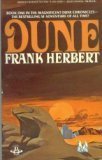 A thing that qualifies as unlikely: I’ve never read Dune before. Unlikely, yes, but all true. I expect I would have gotten around to it, but was reminded prematurely by this girl who inspired me to pick it up because it’s one of her favorites. In a more optimal world, having read it would in some way that I’m failing to imagine inspire her to become suddenly interested in me as date material. Because of a defect in my brain that allows me to conceive of that kind of world, I now have read the book, and therefore, I will talk about it.
A thing that qualifies as unlikely: I’ve never read Dune before. Unlikely, yes, but all true. I expect I would have gotten around to it, but was reminded prematurely by this girl who inspired me to pick it up because it’s one of her favorites. In a more optimal world, having read it would in some way that I’m failing to imagine inspire her to become suddenly interested in me as date material. Because of a defect in my brain that allows me to conceive of that kind of world, I now have read the book, and therefore, I will talk about it.
In a trend that fits more well with the actual world, I’m left a little bit mystified by the whole experience. I pretty well understand what happened, and now want to go back and watch the movie and see if it makes more sense. Except for the part where I don’t actually understand what happened at all. The discrete events made perfect sense, yes, but I’m really unclear on what it means to have gotten to the end of the story. It feels like there’s this symbolism rumbling around below the surface that transforms it from entertaining sci-fi vengeance war into shining, brilliant example of the genre, and I’m just not seeing it. (Spoilers for a forty-year old book below the cut. Panic!)
Here’s what I did understand:
1) The Fremen are descended from Earth’s Muslim types, and if the book had been written today, Frank Herbert would probably not only be an enemy of the state for daring to applaud Muslim guerilla tactics but also an enemy of the Muslims for presuming to provide them with a modern-day Mohammed. (And Allah save Kyle McLachlan for portraying him.)
2) The Bene Gesserit spent a thousand years trying to gengineer their Chosen One, only to find that when he arrived they neither controlled nor understood him. I could really get into the schadenfreude of that, except for the part where I have no better understanding of Paul than they had. Being left outside the same door as the characters just ends up being annoying. (As far as the whole Robert Jordan thing, this one is a much closer match than the Aiel/Fremen comparisons I always used to see on rasfwrj. Of course, it’s also a much closer match to Saviors throughout history, so that’s to be expected.)
…and if there’s anything else I didn’t understand, I didn’t even realize that it was complex or that I was failing to understand it. The pilots’ guild, the imperial politicking, the war, all that made perfect sense to me and left the story feeling incomplete in the positive way that fully developed worlds with lots of history should. I guess the loose thread that’s driving me crazy is: what did Paul accomplish? The Fremen are free, and that’s sufficient. Why become Emperor? Why is he regarded in the future history seen through all the book excerpts as a brilliant philosopher? It felt like a standalone book with a cliffhanger ending, and despite knowing there are more books to read, that just annoys me.
Still, though: reasonable prose, exciting plot, shadows of uniqueness that are still there even after decades of influencing an entire genre of novel, and one can never sell short the feeling of finally being let in on a treasure trove of cultural references. I’m pretty sure if I wasn’t so very puzzled, I would like it a lot. As it is, though, I’m mostly puzzled about why people like it so well, when it left me so… puzzled.